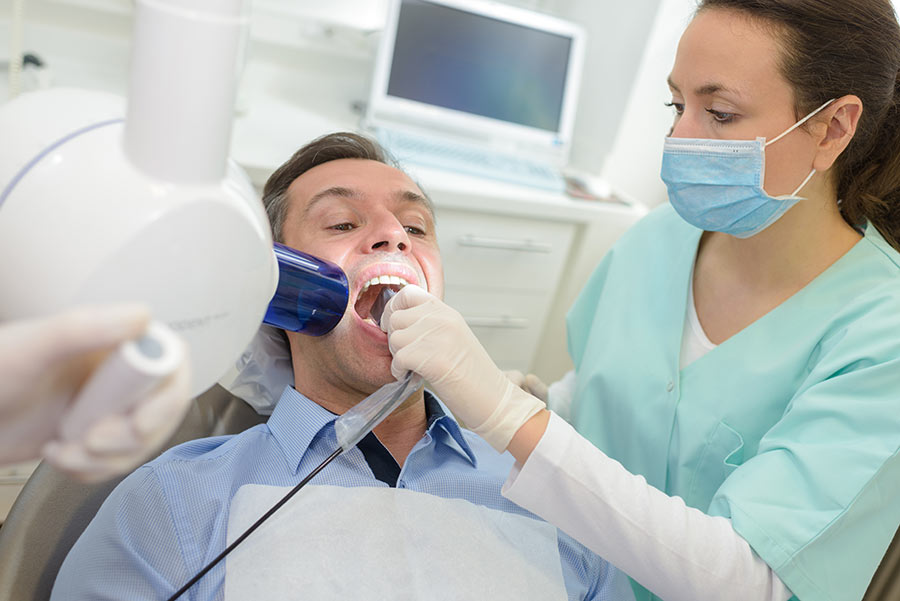Let us take care of your smile
Aquidneck Island's Top Rated Dental Office serving Middletown, Portsmouth, and Newport.

Dental Care Services
Providing Dental Care in the Following Areas
Dr. Faiella and her team at Island Dental Health believe that having a beautiful, healthy smile is incredibly important for your self-confidence, overall well-being and happiness. We take pride in exceptional service and utilize the most technologically advanced equipment and knowledge available to date to provide you with the best possible care. Our primary goal is to provide you with an extraordinary experience, alleviating your fears and concerns, and helping to give you the smile you have always desired! Whether that means spending extra time educating you about your options or reviewing your individual goals; we only want to make you healthy, happy, and to give you a reason to SMILE!
We offer many cosmetic procedures such as porcelain veneers, teeth whitening, Invisalign, composite fillings, and Pediatric Dentistry. During your new patient consultation, Dr. Faiella will work with you to develop a treatment plan that fits your unique needs.

About Our Dental Office
A Higher Standard of Dental Care
Our mission is to provide our patients with guidance towards wellness and optimum oral health. We will strive to raise their level of awareness of the role good oral hygiene plays in the overall well-being of the individual for life. We promise to continually pursue excellence through advanced education, team growth, and mastery of leading edge technology.
Do You Have any Questions?
We want to answer any questions you might have about your oral care or upcoming dental visit. Please contact us if you cannot find an answer to your question on our website.

Crown – A cap, usually made of zirconia, porcelain, or metal, that is placed over a tooth to restore its appearance and function.
Fixed Bridge – A restoration that can replace a missing tooth. It consists of a pontic (artificial tooth) suspended between adjacent teeth (known as abutments)
You can find additional information on Crowns & Bridges here
Dental implants are a safe, predictable solution for replacing missing teeth. Implants look and feel like your natural teeth. Patients with implants experience improved taste and appetite as they are able to chew without pain or discomfort. Dental implants also improve your aesthetic appearance by rebuilding your smile, and preserving your facial structure. Your overall quality of life can improve with dental implants.
The temporomandibular joints (TMJ) are the 2 joints that connect your lower jaw to your skull and are one of the most complex joints in the body. These joints, along with several muscles, allow the mandible to move up and down, side to side, and forward and back. When the mandible and the joints are properly aligned, smooth muscle actions, such as chewing, talking, yawning, and swallowing, can take place. Any problem that prevents the complex system of muscles, bones, and joints from working together in harmony may result in temporomandibular disorder.
Cavities are permanently damaged areas in the hard surface of your teeth that develop into tiny openings or holes. Also known as tooth decay or caries, cavities are caused by a combination of factors, including your oral hygiene, diet, and the bacteria in your mouth. The bacteria in your mouth feed on sugary or starchy foods or drinks, and then convert these carbohydrates into acids. The bacteria, acids, food and saliva mix to form a substance known as plaque. If not regularly removed from the teeth, plaque will erode tooth enamel and cause cavities.
Dental radiographs (or x-rays) are an important part of your routine dental care. Along with an oral examination, they provide your dentist with a more complete view of what’s happening in your mouth, including the teeth, bones, and soft tissues. Without them, your dental team could potentially miss diagnosing many issues, including cavities, dental infections, diseases of the bone, developmental disorders, cysts and tumors.
Dentists follow the ALARA principle, which stands for “As Low As Reasonably Achievable,” when obtaining radiographs. This radiation safety principle limits your exposure. The amount of radiation that you receive from dental x-rays is often much lower than you would get from everyday activities. For example, the amount of radiation of a single x-ray is equivalent to eating two bananas and having a full mouth series (18 x-rays, usually done every 5 years) is a third of the radiation that you receive from your normal daily environmental radiation exposure (cell phones, sun exposure, etc.)
Click here to learn more about the safety of dental X-rays and their importance


